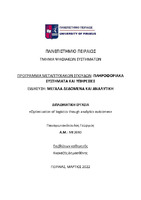Optimization of logistics though analytics outcomes

Master Thesis
Συγγραφέας
Παναγιωτακόπουλος, Γεώργιος
Ημερομηνία
2022-03Επιβλέπων
Κυριαζής, ΔημοσθένηςΠροβολή/
Λέξεις κλειδιά
Transport equivalent ; Supply chain analysis ; Island trade ; Island economic activity ; Analysis of transport cost subsidiesΠερίληψη
Μεταφορικό Ισοδύναμο είναι το μέτρο, με τη θέσπιση του οποίου επιδιώκεται η εξίσωση του
κόστους μεταφοράς με μέσα μαζικής μεταφοράς από την ηπειρωτική Ελλάδα σε νησί ή από νησί σε
νησί με το κόστος που θα ίσχυε στην ηπειρωτική Ελλάδα για την ίδια απόσταση. Οι νησιωτικές κοινωνίες αντιμετωπίζουν επείγοντα ζητήματα ερημοποίησης και μακροχρόνια ζητήματα απομόνωσης από τις κεντρικές αγορές προϊόντων στις οποίες αναπτύσσονται οι οικονομίες κλίμακας. Ως αποτέλεσμα αυτών είναι αναγκασμένες να επιβαρύνονται με το επιπλέον κόστος θαλάσσιας μεταφοράς ανθρώπων και προϊόντων στα νησιά σε σχέση με τη χερσαία μεταφορά στην ενδοχώρα. Το επιπλέον αυτό κόστος είναι από τις κύριες αιτίες ενδοπεριφερειακών ανισοτήτων, μείωσης του νησιωτικού πληθυσμού και αποτροπής ίδρυσης και παραμονής των επιχειρήσεων στα νησιά. Η εφαρμογή του μεταφορικού ισοδύναμου εναρμονίζει το κόστος μεταφοράς εμπορευμάτων, από και προς τα νησιά, σε σχέση με το κόστος των χερσαίων μεταφορών. Το κόστος μετακίνησης προϊόντων επιδοτείται από πόρους του Προγράμματος Δημοσίων Επενδύσεων με κανόνες συμβατούς για τις κρατικές ενισχύσεις στην Ε.Ε., σε βαθμό που εναρμονίζει τη μετακίνηση τους στη θάλασσα με το κόστος στη στεριά. Σκοπός είναι η εξασφάλιση της ίσης μεταχείρισης προς τις νησιωτικές κοινότητες αναφορικά με το μεταφορικό κόστος που καλούνται να πληρώνουν για τις μεταφορές τους, το οποίο θα πρέπει να είναι ανάλογο με το τίμημα που καταβάλουν αντίστοιχου μεγέθους κοινότητες της ηπειρωτικής χώρας. Συνεπώς στοχεύει στην ελαχιστοποίηση του οικονομικού μειονεκτήματος που επιβαρύνει τις απομακρυσμένες νησιωτικές κοινότητες έτσι ώστε με τη σειρά τους να συμβάλλουν περισσότερο στην οικονομική ανάπτυξη της χώρας.


